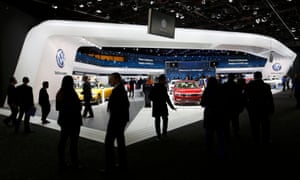
The Detroit auto show, where today’s reality will be on display.
Photograph: Mark Blinch/Reuters
Detroit’s auto giants take fight to big tech as largest US car show kicks into gear
The North American International Auto show has been overshadowed by CES – but it’s decided to stick to what it does best: cars and trucks, not hi-tech
Detroit in winter has never been an easy sell, but for generations of car lovers Motor City has been the only place to be come January, when America’s largest car show kicks into gear.
In recent years, as tech has moved ever more aggressively into the automobile industry, the annual North American International Auto Show has been overshadowed by the Consumer Electronics Show (CES) – an industry trade show held this week in Las Vegas. But as Detroit’s auto giants increasingly take the fight to Silicon Valley, analysts say its premier auto show is here to stay.
“The narrative about Detroit dying is an easy one, but it’s not dying, it’s changing,” Stephanie Brinley, a senior analyst at IHS Markit, said. “It’s not just Detroit – other auto shows are facing the same issues – but I don’t think auto shows are going anywhere. They’re changing and they continue to evolve.”
CES has become an important venue for automakers to showcase technological advances. But Brinley said CES was a trade show aimed at industry insiders while Detroit, a public show, opened its doors to consumers. More than 800,000 people attended last year for a chance to kick the tires of products that will be available this year and the show pumped an estimated $450m into the local economy.
“They are really two different shows – one is a trade show with a consumer element while the other is a consumer show with a trade element,” Matt DeLorenzo, an editor at Kelley Blue Book, said. “CES will win on advanced technology, but not necessarily on products that the consumer can buy.”
Most of the auto industry news out of CES was big-picture – from Ford’s announcement that it would partner with a Silicon Valley startup to boost its autonomous vehicle programme to Toyota’s announcement that it would soon offer Amazon’s digital assistant Alexa in its vehicles.
Detroit will have more than its fair share of tech (hometown star General Motors, not Tesla or Google, will be the first to launch a self-driving production vehicle with no steering wheel) but the big reveals are likely to be new trucks, a new Chevrolet Silverado and a Chrysler Ram 1500, and cars that people will actually buy, this year.

A roborace car on display at CES. Photograph: Blevi/ZUMA Wire/REX/Shutterstock
Muncey said that, per last year’s numbers, NAIAS still fared well among auto-related shows, ranking third in the world behind Shanghai (which is focused upon the world’s largest automotive market) and Geneva. In an effort to avoid being drowned out by CES buzz, organizers of the Detroit show began hosting a tech-focused component last year called AutoMobili-D. Max Muncey, the public relations manager for NAIAS, said AutoMobili-D, which will include a kick-off keynote speech by US transportation secretary Elaine Chao, has been expanded this year to cover a 150,000 sq ft chunk of a million-square-foot show.
DeLorenzo, who looked askance at AutoMobili-D, said that it was important to distinguish the shows from the industry. The new tech focus was, he said, a distraction from what Detroit does best – cars and trucks.
“Auto shows in general should stick to their knitting, and be more about cars you can buy rather than speculative tech,” he said. “I don’t think Detroit will be remembered this year for any advances or big announcements on the autonomous front, and I can’t think of any earth-shattering news coming out of CES, for that matter.”
Both Muncey and Brinley said that Detroit still stood as an important global auto manufacturing hub – one that will maintain its role as an influencer. As to the perceived push-pull over automotive tech between Detroit and Silicon Valley, DeLorenzo viewed it as more of a symbiotic relationship.
“Silicon Valley needs Detroit,” he said. “All the autonomous technology is worth nothing if it doesn’t have a vehicle to pilot around. Detroit builds vehicles, hence, Silicon Valley needs Detroit more than Detroit needs Silicon Valley.”
While autonomy and artificial intelligence continue to dazzle and inspire visions of a hi-tech future, in chilly, snow-swept Detroit today’s reality will be on display.